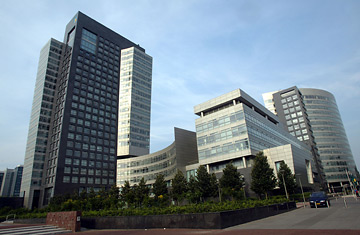
ABN-AMRO bank headquarters in Amsterdam, Netherlands.
No one said carrying off the biggest banking deal in history would be easy, but the ongoing, three month-long tug of war for ABN Amro trumps most takeover bids for drama. While rival European lenders have swooped for the Dutch bank in recent months, activist shareholders and even the Dutch courts have intervened in a drawn out saga offering no shortage of twists and turns.
And the latest twist has been a doozy. On Monday, Barclays announced that China Development Bank (CDB) and Temasek, an investment group owned by the Singapore government, had agreed to invest $5 billion in Barclays now in support of its bid for ABN, and up to $18.6 billion if the takeover is successful.
Both Asian investors will become major investors in the British bank. If Barclays is successful, the state-owned CDB would own up to around 8% of Barclays' stock. Its investment is "by far the biggest external investment ever made by China," Barclays CEO John Varley crowed Monday. "And it's very good for Barclays."
No kidding. With the extra cash to spend, Barclays increased its bid for ABN Monday to just over $93 billion, with over a third of it offered in cash. That's more than its previous approach — the all-stock bid, agreed with ABN back in April, was worth around $90 billion — but still falls short of the $98 billion offered last week by a consortium of European banks led by Royal Bank of Scotland. That bid, backed by Spain's Santander and Belgian-Dutch group Fortis, is almost all in cash.
So who has the advantage? Before putting up its offer last week, RBS looked like it was playing catch up. Its earlier bid for ABN was conditional on it getting LaSalle, ABN's U.S. arm, as part of any deal. But a Dutch court earlier this month denied ABN shareholders the right to vote on its plan to sell LaSalle to Bank of America.
Despite that setback, RBS maintained its interest. Moreover, increasing the cash component in its latest offer has put RBS ahead, analysts contacted by TIME say. Hedge funds and speculators control a massive chunk of ABN — and pressure from hedge funds for it to increase shareholder value forced ABN into merger talks with Barclays in the first place. They may be keen to hold out for the higher price. "We do not expect the RBS consortium will need to increase its offer, and therefore remains the more likely victor," analysts at Bear, Stearns said in a note published Monday.
But the potential access to China's banking market offered by partnering with CDB makes the decision "a bit more complicated for ABN shareholders," says Richard Hunter, head of U.K. equities at stockbrokers Hargreaves Lansdown in London. He is not ruling out the new Barclays bid as being more attractive to ABN for long-term strategic reasons.
The only guaranteed prediction: there's more drama to come.
